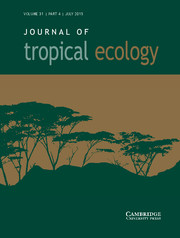Crossref Citations
This article has been cited by the following publications. This list is generated based on data provided by
Crossref.
WILLIAMS, PAUL R.
CONGDON, ROBERT A.
GRICE, ANTHONY C.
and
CLARKE, PETER J.
2003.
Fire‐related cues break seed dormancy of six legumes of tropical eucalypt savannas in north‐eastern Australia.
Austral Ecology,
Vol. 28,
Issue. 5,
p.
507.
Sankaran, Mahesh
Ratnam, Jayashree
and
Hanan, Niall P.
2004.
Tree–grass coexistence in savannas revisited – insights from an examination of assumptions and mechanisms invoked in existing models.
Ecology Letters,
Vol. 7,
Issue. 6,
p.
480.
Furley, Peter
2004.
Tropical savannas.
Progress in Physical Geography: Earth and Environment,
Vol. 28,
Issue. 4,
p.
581.
WILLIAMS, PAUL R.
CONGDON, ROBERT A.
GRICE, ANTHONY C.
and
CLARKE, PETER J.
2004.
Soil temperature and depth of legume germination during early and late dry season fires in a tropical eucalypt savanna of north‐eastern Australia.
Austral Ecology,
Vol. 29,
Issue. 3,
p.
258.
Chesson, Peter
Gebauer, Renate L. E.
Schwinning, Susan
Huntly, Nancy
Wiegand, Kerstin
Ernest, Morgan S. K.
Sher, Anna
Novoplansky, Ariel
and
Weltzin, Jake F.
2004.
Resource pulses, species interactions, and diversity maintenance in arid and semi-arid environments.
Oecologia,
Vol. 141,
Issue. 2,
p.
236.
Wiegand, Kerstin
Ward, David
and
Saltz, David
2005.
Multi‐scale patterns and bush encroachment in an arid savanna with a shallow soil layer.
Journal of Vegetation Science,
Vol. 16,
Issue. 3,
p.
311.
Meyer, Katrin M.
Ward, David
Moustakas, Aristides
and
Wiegand, Kerstin
2005.
Big is not better: small Acacia mellifera shrubs are more vital after fire.
African Journal of Ecology,
Vol. 43,
Issue. 2,
p.
131.
Wiegand, Kerstin
Ward, David
and
Saltz, David
2005.
Multi‐scale patterns and bush encroachment in an arid savanna with a shallow soil layer.
Journal of Vegetation Science,
Vol. 16,
Issue. 3,
p.
311.
Raddad, El Amin Yousif
Salih, Ahmed Ali
Fadl, Mohamed Ahmed El
Kaarakka, Vesa
and
Luukkanen, Olavi
2005.
Symbiotic nitrogen fixation in eight Acacia senegal provenances in dryland clays of the Blue Nile Sudan estimated by the 15N natural abundance method.
Plant and Soil,
Vol. 275,
Issue. 1-2,
p.
261.
Cochard, R.
and
Jackes, B.R.
2005.
Seed Ecology of the Invasive Tropical Tree Parkinsonia aculeata.
Plant Ecology,
Vol. 180,
Issue. 1,
p.
13.
Jiménez-Lobato, V.
and
Valverde, T.
2006.
Population dynamics of the shrub Acacia bilimekii in a semi-desert region in central Mexico.
Journal of Arid Environments,
Vol. 65,
Issue. 1,
p.
29.
Aguilar, Ramiro
Ashworth, Lorena
Galetto, Leonardo
and
Aizen, Marcelo Adrián
2006.
Plant reproductive susceptibility to habitat fragmentation: review and synthesis through a meta‐analysis.
Ecology Letters,
Vol. 9,
Issue. 8,
p.
968.
Moustakas, Aristides
Guenther, Matthias
Wiegand, Kerstin
Mueller, Karl‐Heinz
Ward, David
Meyer, Katrin M.
and
Jeltsch, Florian
2006.
Long‐term mortality patterns of the deep‐rooted Acacia erioloba: The middle class shall die!.
Journal of Vegetation Science,
Vol. 17,
Issue. 4,
p.
473.
Moustakas, Aristides
Guenther, Matthias
Wiegand, Kerstin
Mueller, Karl-Heinz
Ward, David
Meyer, Katrin M.
and
Jeltsch, Florian
2006.
Long-term mortality patterns of the deep-rooted Acacia erioloba: The middle class shall die!.
Journal of Vegetation Science,
Vol. 17,
Issue. 4,
p.
473.
Andersen, Gidske L.
Krzywinski, Knut
and
Freckleton, Rob
2007.
Mortality, Recruitment and Change of Desert Tree Populations in a Hyper-Arid Environment.
PLoS ONE,
Vol. 2,
Issue. 2,
p.
e208.
Raddad, El Amin Yousif
2007.
Ecophysiological and genetic variation in seedling traits and in first-year field performance of eight Acacia senegal provenances in the Blue Nile, Sudan.
New Forests,
Vol. 34,
Issue. 3,
p.
207.
CRAMER, M. D.
CHIMPHANGO, S. B. M.
VAN CAUTER, A.
WALDRAM, M. S.
and
BOND, W. J.
2007.
Grass competition induces N2 fixation in some species of African Acacia.
Journal of Ecology,
Vol. 95,
Issue. 5,
p.
1123.
GOHEEN, JACOB R.
YOUNG, TRUMAN P.
KEESING, FELICIA
and
PALMER, TODD M.
2007.
Consequences of herbivory by native ungulates for the reproduction of a savanna tree.
Journal of Ecology,
Vol. 95,
Issue. 1,
p.
129.
Riginos, Corinna
and
Young, Truman P.
2007.
Positive and negative effects of grass, cattle, and wild herbivores on Acacia saplings in an East African savanna.
Oecologia,
Vol. 153,
Issue. 4,
p.
985.
Bond, William J.
2008.
What Limits Trees in C4 Grasslands and Savannas?.
Annual Review of Ecology, Evolution, and Systematics,
Vol. 39,
Issue. 1,
p.
641.




